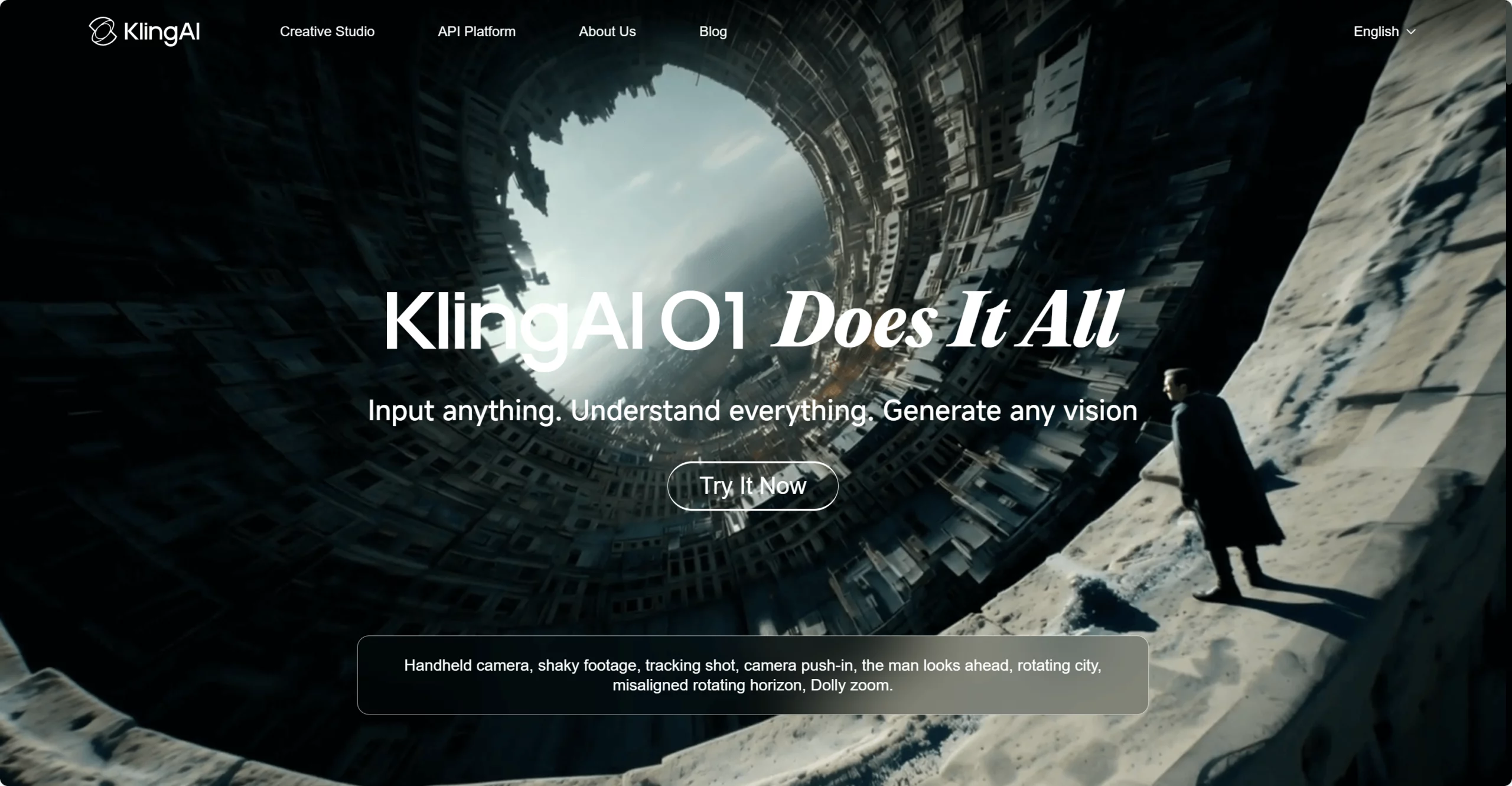Artificial intelligence is increasingly becoming a pivotal element in the business landscape. Over a third of businesses are now leveraging AI for marketing, underscoring its rising significance, particularly for small businesses. Small businesses using AI for marketing can gain strategic advantages that boost customer service and fortify their marketing initiatives. By employing AI for small business marketing, these enterprises can refine their strategies through the analysis of social media trends and user engagement. AI for small business marketing revolutionizes the marketing process, facilitating targeted approaches that enhance growth and efficiency.
Understanding AI for Small Business Marketing
What is AI in Marketing?
Definition and Key Concepts
Artificial Intelligence (AI) in marketing refers to the use of advanced algorithms and machine learning techniques to analyze data, automate tasks, and enhance marketing strategies. AI enables businesses to understand customer behavior, predict trends, and personalize marketing efforts. The integration of AI in marketing allows for more efficient decision-making, better lead generation, and improved customer engagement.
Examples of AI Tools in Marketing
Several AI tools assist small businesses in optimizing their marketing efforts. Some platforms even offer features that allow businesses to create QR codes seamlessly integrated into their marketing campaigns. HubSpot Marketing provides AI-driven analytics to help businesses understand customer preferences. Zoho Social offers social media management powered by AI, enabling targeted content delivery. Google Analytics uses AI to provide insights into user behavior and engagement. WeShop AI helps to streamline photo generation. These tools streamline marketing processes and enhance the effectiveness of campaigns.
Why AI is Important for Small Businesses
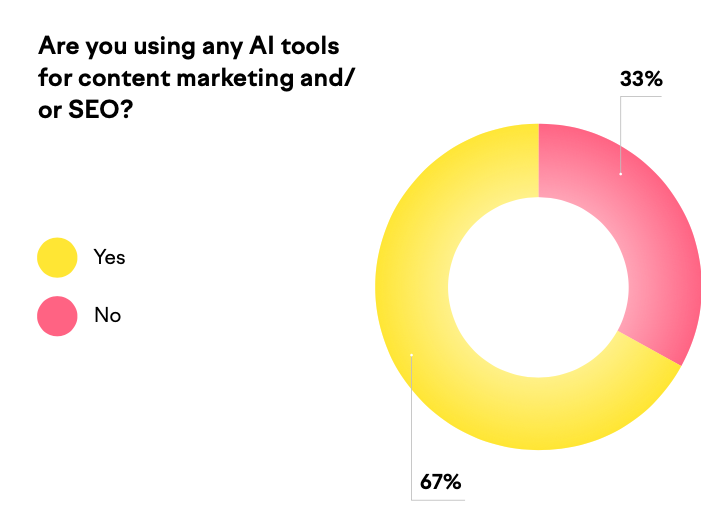
Cost-effectiveness
AI offers a cost-effective solution for small businesses by automating repetitive tasks and reducing manual labor. Automation of targeting, lead generation, and content creation saves time and resources. Flux 1 AI helps small businesses generate high-quality visuals, further enhancing efficiency. AI tools help small businesses achieve better results with lower marketing costs. The use of AI-driven insights leads to more efficient allocation of marketing budgets.
Competitive Advantage
AI provides a competitive advantage by enabling small businesses to compete effectively in the digital landscape. AI marketing tools offer deeper insights into customer behavior and preferences. This allows for more targeted and effective marketing campaigns. Small businesses can leverage AI to enhance their marketing strategies and connect with their audience more effectively. The ability to deliver personalized experiences leads to higher conversions and better return on investment.
Implementing AI in Small Business Marketing
Identifying Marketing Needs
Small businesses must first evaluate their existing marketing strategies. This evaluation helps identify strengths and weaknesses. Analyzing current strategies reveals areas that require improvement. Businesses can then determine where AI can provide the most value. AI for small business marketing can address gaps in customer engagement or data analysis.
Determining areas for AI integration involves understanding specific business goals. Businesses should assess which tasks consume the most time and resources. AI can automate repetitive tasks, freeing up valuable time. Identifying these tasks allows businesses to focus on strategic initiatives. AI can also enhance personalization efforts by analyzing customer data. This leads to more targeted marketing campaigns.
Choosing the Right AI Tools
Selecting the appropriate AI tools is crucial for success. Businesses should consider several criteria when choosing tools. Ease of use, scalability, and cost are important factors. Tools should align with the business’s marketing objectives. Popular AI marketing tools for small businesses include platforms like HubSpot and WeShop AI. These tools offer features such as automated content creation and customer insights.
AI tools should integrate seamlessly with existing systems. Compatibility ensures a smooth transition and maximizes efficiency. Businesses should also consider the level of support provided by the tool vendor. Reliable customer support can assist with troubleshooting and optimization. Investing in the right tools enhances the effectiveness of ai for small business marketing.
Businesses are making the following types of content with AI
WeShop AI specializes in social media posts, images and ads.
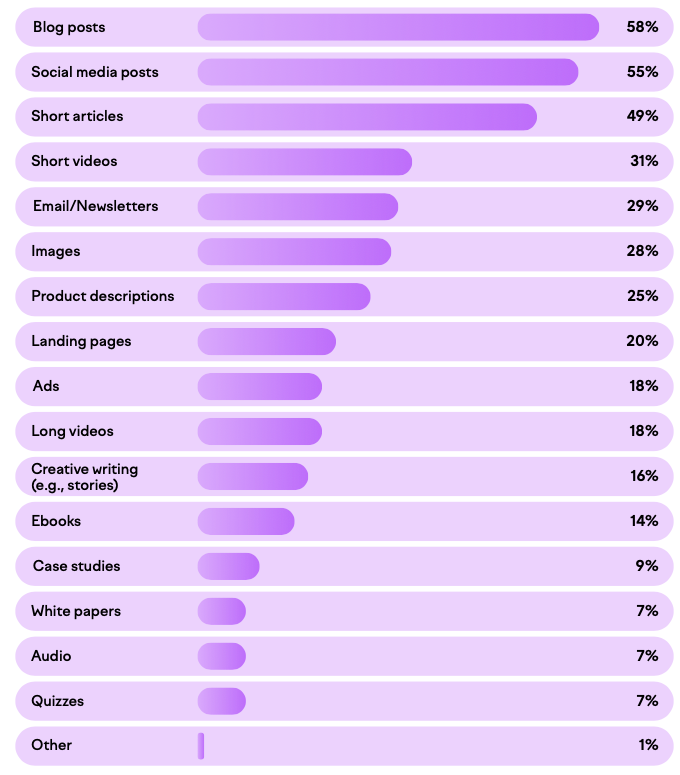
Integrating AI into Marketing Strategies
A step-by-step integration process ensures successful implementation. Businesses should start with a pilot program to test AI capabilities. This approach minimizes risks and allows for adjustments. The pilot program should focus on specific marketing tasks. Successful pilots can then expand to other areas of marketing.
Training staff using best HR SaaS software is essential for managing change. Employees need to understand how to use AI tools effectively. Training programs should cover both technical and strategic aspects. Staff should learn how AI can improve marketing outcomes. Ongoing education keeps employees updated on AI advancements. Proper training ensures that small business using ai for marketing achieves its full potential.
Benefits of AI in Marketing for Small Businesses
We saw that 79% of businesses report an increase in content quality when using AI tools.
For the 30% of respondents who don’t use AI because they are worried about the quality of the output, this should be eye-opening:
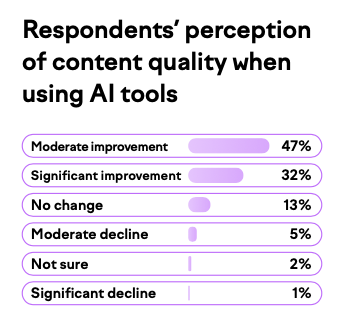
Enhanced Customer Engagement
Personalized Marketing Campaigns
AI tools empower small businesses to create personalized marketing campaigns. By analyzing customer data, AI identifies individual preferences and behaviors. This allows businesses to tailor their marketing messages. Personalized campaigns resonate more with customers, leading to higher engagement rates. According to a survey, 34.1% of marketers reported significant improvements in marketing outcomes due to AI. These improvements stem from AI’s ability to deliver targeted content that appeals directly to the audience. For example, businesses can use AI to create QR codes that direct customers to personalized recommendations, exclusive discounts, or VIP access pages, enhancing engagement and customer experience.
Improved Customer Service
AI enhances customer service by providing quick and accurate responses. Chatbots and virtual assistants handle customer inquiries efficiently. This reduces wait times and improves customer satisfaction. AI-driven customer service tools can operate 24/7, offering support outside regular business hours. A great example is the customer service AI tool by Aircall, which combines automation with human-like interactions to streamline support workflows. This availability builds trust and loyalty among customers. Marketing professionals have noted that AI’s precision and data-driven insights lead to better quality work, improving overall customer interactions.
Increased Efficiency and Productivity
How AI content boosts content and content ROI
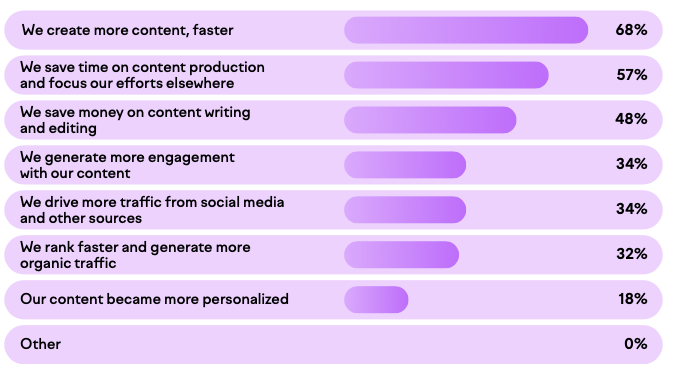
Automation of Repetitive Tasks
AI automates repetitive tasks, freeing up valuable time for small businesses. Tasks such as data entry, email marketing, and social media posting become automated. This allows employees to focus on strategic activities that require human creativity. A survey revealed that 52% of marketing professionals experienced increased speed and efficiency in workflows due to AI. Automation not only saves time but also reduces the risk of human error, ensuring consistent and reliable results.
Data-Driven Decision Making
AI provides data-driven insights that enhance decision-making processes. By analyzing large volumes of data, AI identifies trends and patterns. This information helps businesses make informed marketing decisions. AI tools offer predictive analytics, allowing businesses to anticipate customer needs. This proactive approach leads to more effective marketing strategies. 60% of marketers reported improved work quality thanks to AI’s insights and precision. Data-driven decision making ensures that marketing efforts align with customer expectations and market demands.
AI plays a transformative role in small business marketing. AI tools provide deeper insights into customer behavior and preferences. Small businesses can achieve more targeted and effective marketing campaigns. AI automates tasks, analyzes data, and delivers personalized experiences. Businesses can reach and engage their target audience effectively. AI leads to higher conversions and better ROI. Embracing AI unlocks a new level of marketing personalization. Businesses connect with customers in meaningful ways. AI-powered solutions offer a competitive advantage. Small businesses can scale and grow successfully. AI’s future in marketing promises continued innovation and opportunities.

